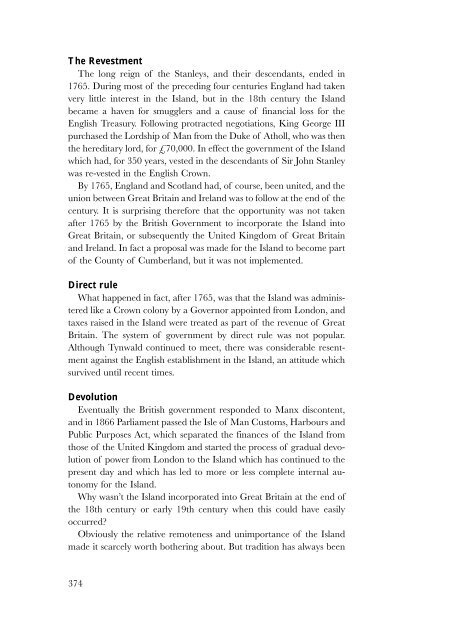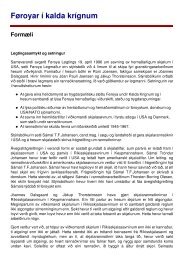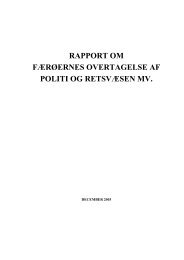- Page 2 and 3:
Álit um stýrisskipanarviðurskift
- Page 4 and 5:
Álit um stýrisskipanarviðurskift
- Page 6 and 7:
II Vald í Føroyum . . . . . . . .
- Page 8 and 9:
III At lóggeva og skipa fyri fyris
- Page 10 and 11:
Á landsstýrisfundi 1. apríl 1993
- Page 12 and 13:
KAP. 2. Samandráttur av álitinum
- Page 14 and 15:
myndugleika í yvirtiknum málum, o
- Page 16 and 17:
seta í verk nýggj tiltøk, umfram
- Page 18 and 19:
skrúðgonguna á ólavsøku upp í
- Page 20 and 21:
Greinin broytir ikki ta støðu, at
- Page 22 and 23:
KAP. 3. Stýrisskipanarviðurskifti
- Page 24 and 25:
verið so. Hetta sæst av formulari
- Page 26 and 27:
sett í verk, áðrenn øll statssk
- Page 28 and 29:
Noreg og gomlu skattlond tess kvett
- Page 30 and 31:
skipast í Føroyum. Í 1843 verðu
- Page 32 and 33:
íslendingar, um grundlógin skuldi
- Page 34 and 35:
alle disse lande og provinser, alts
- Page 36 and 37:
sag vil blive videre fremmet, såsn
- Page 38 and 39:
e) Det sørger for sikkerheden og f
- Page 40 and 41:
gildi, og hon skuldi galda í 5 ár
- Page 42 and 43:
oðað, men eingin hevur nakrantí
- Page 44 and 45:
kongslógin, arvaeinaveldislógin o
- Page 46 and 47:
KAP. 4. Galdandi stýrisskipan í F
- Page 48 and 49:
Føroyum. Somuleiðis hevur fólkaa
- Page 50 and 51:
Av tí at kongur er ábyrgdarleysur
- Page 52 and 53:
harrans. Uttan samtykki fólkatings
- Page 54 and 55:
samband við, at nýtt fólkatingsv
- Page 56 and 57:
limunum er á fundi og luttekur í
- Page 58 and 59:
6. Frælsisrættindi og aðrar fyri
- Page 60 and 61:
áðrenn teir fáa gildi fyri Føro
- Page 62 and 63:
er tó praksis við at broytast nak
- Page 64 and 65:
II Vald í Føroyum A. 1940 bráðf
- Page 66 and 67:
B. Heimastýrisskipanin 1. Av hvør
- Page 68 and 69:
at heimastýrisskipanin er ein ví
- Page 70 and 71:
13.05.1948 samtykti løgtingið at
- Page 72 and 73:
sáttmála um fiskiskap síðan mi
- Page 74 and 75:
muligheder for at overtage sagsomr
- Page 76 and 77:
administration. Angaaende saadanne
- Page 78 and 79:
Ávísir løgfrøðingar meta tó,
- Page 80 and 81:
Eftir hvørji skipan Forsøgan hjá
- Page 82 and 83:
Heimastýrislógin § 1, 2. pkt., f
- Page 84 and 85:
dagur sunnudagur, tá dagin eftir s
- Page 86 and 87:
§ 12, stk. 1, 2. pkt. 3 viðgerði
- Page 88 and 89:
fær trið valda mannin. Soleiðis
- Page 90 and 91:
- Sbr. løgtingslóg nr. 78 frá 21
- Page 92 and 93:
umboðsvaldslógini, at áseta frá
- Page 94 and 95:
Sum umrøtt á bls. 59 ff ummælir
- Page 96 and 97:
var sagt um, hvør hevði heimildin
- Page 98 and 99:
tingi, og t.v.s. til øvugdømis, a
- Page 100 and 101:
§ 11. For medlemmer af det kongeli
- Page 102 and 103:
§ 26. Kongen har ret til at lade s
- Page 104 and 105:
gæring herom med angivelse af dags
- Page 106 and 107:
Stk. 3. Statsregnskabet med revisor
- Page 108 and 109:
ges, som strider mod sædeligheden
- Page 110 and 111:
ind, efter at mængden tre gange i
- Page 112 and 113:
verða flutt til heimastýrið. Á
- Page 114 and 115:
§ 8. Um føroyska heimastýrið sk
- Page 116 and 117:
andi í Føroyum, og sum ikki strí
- Page 118 and 119:
Tvungin vanlukkutrygging. Arbeiðar
- Page 120 and 121:
Bókførsla. Kreditfeløg o.l., try
- Page 122 and 123:
landsstýrisins verður nærri áse
- Page 124 and 125:
§ 14. Løgtingið avger gildi av v
- Page 126 and 127:
leggja fyri Løgtingið til viðger
- Page 128 and 129:
ið samsvarandi ríkislóg nr. 137,
- Page 130 and 131:
inum. Landsstýrið ásetir við re
- Page 132 and 133:
I Rakstrarroknskapur landskassans f
- Page 134 and 135:
III Uttanlandsskuld Føroya (ult.
- Page 136 and 137:
I Inngangur Nevndin hevur kannað y
- Page 138 and 139:
III Landsstýrið A. Valt av løgti
- Page 140 and 141:
Eyðfinnur Heinesen, cand. scient p
- Page 142 and 143:
lítil og ongin verklig útbúgving
- Page 144 and 145:
IV Sorinskrivarin og landfútin A.
- Page 146 and 147:
V Onnur viðurskifti A. Um nevndir,
- Page 148 and 149:
ættin hjá grønlendingum og føro
- Page 150 and 151:
I Uppskot til løgtingslóg um stý
- Page 152 and 153:
fundar kl. 10.00 tólvta yrkadag (l
- Page 154 and 155:
løgtingsseta er lokin, falla burtu
- Page 156 and 157:
§ 17. Løgtingið sjálvt ásetur
- Page 158 and 159:
nevndur, boðar løgtingsformaðuri
- Page 160 and 161:
stakur landsstýrismaður situr fyr
- Page 162 and 163:
164 Dómsvaldið § 40. Dómsvaldi
- Page 164 and 165:
Stk. 4. Reglurnar í stk. 1-3 verð
- Page 166 and 167:
tilmæli, sum neyðug eru, til tess
- Page 168 and 169:
II Heildarviðmerkingar Karmurin og
- Page 170 and 171:
III Fíggjarligar avleiðingar av u
- Page 172 and 173:
øvugdømi (modsætningsslutning)
- Page 174 and 175:
givin valrættur til teirra, sum ve
- Page 176 and 177:
Landsstýrið hevur beinleiðis eft
- Page 178 and 179:
formaður fyri tí fólkavaldu samk
- Page 180 and 181:
orgarum (millum 3 og 17%) kunnu rei
- Page 182 and 183:
ímóti tí almenna. Um so er, at a
- Page 184 and 185:
fyrr enn hon er kunngjørd, og tí
- Page 186 and 187:
At meiriluti av øllum tingmonnum,
- Page 188 and 189:
heimild verður latin landsstýrinu
- Page 190 and 191:
fingist við málið á einhvønn h
- Page 192 and 193:
Í ávísum førum koma útreiðslu
- Page 194 and 195:
hjá løgtingsnevndum, stovnum undi
- Page 196 and 197:
sama hátt sum ásett er í grundl
- Page 198 and 199:
Við avtøku av § 19, 2. pkt., 2 l
- Page 200 and 201:
I Broyting av donsku grundlógini U
- Page 202 and 203:
III At lóggeva og skipa fyri fyris
- Page 204 and 205:
KAP. 9. Fremmandar stýrisskipanir
- Page 206 and 207:
209
- Page 208 and 209:
211
- Page 210 and 211:
213
- Page 212 and 213:
215
- Page 214 and 215:
217
- Page 216 and 217:
219
- Page 218 and 219:
2. Stjórnarskrá Lýðveldisins Í
- Page 220 and 221:
223
- Page 222 and 223:
225
- Page 224 and 225:
227
- Page 226 and 227:
229
- Page 228 and 229:
231
- Page 230 and 231:
233
- Page 232 and 233:
B. Noregi Kongeriget Norges Grundlo
- Page 234 and 235:
237
- Page 236 and 237:
239
- Page 238 and 239:
241
- Page 240 and 241:
243
- Page 242 and 243:
245
- Page 244 and 245:
247
- Page 246 and 247:
249
- Page 248 and 249:
251
- Page 250 and 251:
253
- Page 252 and 253:
255
- Page 254 and 255:
257
- Page 256 and 257:
259
- Page 258 and 259:
261
- Page 260 and 261:
263
- Page 262 and 263:
265
- Page 264 and 265:
267
- Page 266 and 267:
269
- Page 268 and 269:
271
- Page 270 and 271:
273
- Page 272 and 273:
275
- Page 274 and 275:
277
- Page 276 and 277:
279
- Page 278 and 279:
281
- Page 280 and 281:
283
- Page 282 and 283:
285
- Page 284 and 285:
287
- Page 286 and 287:
289
- Page 288 and 289:
291
- Page 290 and 291:
293
- Page 292 and 293:
295
- Page 294 and 295:
297
- Page 296 and 297:
299
- Page 298 and 299:
301
- Page 300 and 301:
303
- Page 302 and 303:
305
- Page 304 and 305:
307
- Page 306 and 307:
309
- Page 308 and 309:
311
- Page 310 and 311:
313
- Page 312 and 313:
315
- Page 314 and 315:
317
- Page 316 and 317:
319
- Page 318 and 319:
321
- Page 320 and 321: 323
- Page 322 and 323: 325
- Page 324 and 325: 327
- Page 326 and 327: 329
- Page 328 and 329: 331
- Page 330 and 331: 333
- Page 332 and 333: 335
- Page 334 and 335: 337
- Page 336 and 337: 339
- Page 338 and 339: 341
- Page 340 and 341: 343
- Page 342 and 343: 345
- Page 344 and 345: danne sagsområder skal overgå til
- Page 346 and 347: etydning for det grønlandske erhve
- Page 348 and 349: stemmer ved anden afstemning. I til
- Page 350 and 351: der fornødent, anmode Rigsombudsma
- Page 352 and 353: ende eller midlertidige udvalg efte
- Page 354 and 355: store, afgøres rækkefølgen ved l
- Page 356 and 357: B. Áland Lag nr. 71 af 16.08.1991:
- Page 358 and 359: 361
- Page 360 and 361: 363
- Page 362 and 363: 365
- Page 364 and 365: 367
- Page 366 and 367: 369
- Page 368 and 369: 371
- Page 372 and 373: a significant factor in British his
- Page 374 and 375: een, and continues to be, that the
- Page 376 and 377: power to give general directions to
- Page 378 and 379: Privy Council An appeal lies from t
- Page 380 and 381: adoption, become, for the most part
- Page 382 and 383: employment. In 1982 there were abou
- Page 384 and 385: Zealand Appeals from the Court of A
- Page 386 and 387: Cottage hospitals have been built a
- Page 388 and 389: Copra . . . . . . . . . . . . . . .
- Page 390 and 391: Turnover tax. A turnover tax of 9 p
- Page 392 and 393: 75 m in length and up to 4.5 m drau
- Page 394 and 395: KAP. 10. Bókmentir um stýrisskipa
- Page 396 and 397: Betænkning angående lån fra Kred
- Page 398 and 399: kongens overtagelse af enehandelen
- Page 400 and 401: lagtingsvalget i november 1946 = St
- Page 402 and 403: Debes, Hans Jacob. Færøerne. Iden
- Page 404 and 405: Patursson, Erlendur. Some critical










